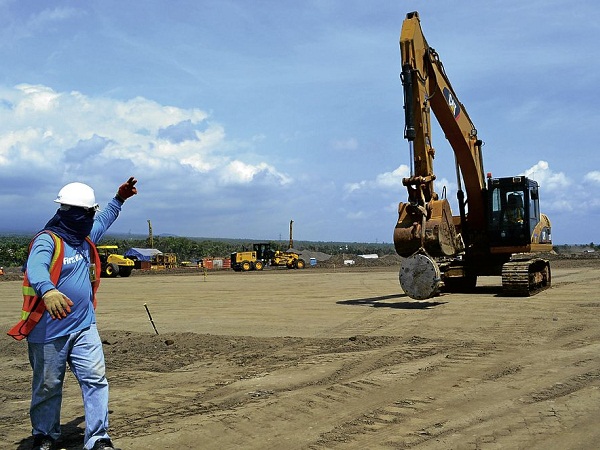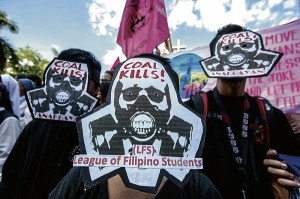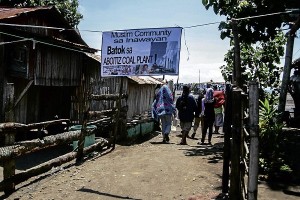When dugongs, rivers go to court

PREPARATION work is ongoing on the site of yet another coal plant in Binugao in Toril District, Davao City. The project, by Aboitiz Power, has been met with protests by local officials and environmental groups. CONTRIBUTED PHOTO
After communities opposed to coal-fired power plants in Mindanao failed to catch the attention of their leaders, expect dugongs, even rivers and watersheds, to file cases in court to stop these projects.
“It’s not only the people, or the fisherfolk, who can file cases,” said Juland Suazo, spokesperson of the environment group Panalipdan in southern Mindanao.

PROTESTERS wear masks at a rally against the Binugao coal plant being built amid opposition from officials of Davao City and groups campaigning against the use of coal for power generation. KARLOS MANLUPIG
“Under our environment laws, even Mother Nature can file lawsuits,” he said, citing the Clean Water Act as an enabling law for the constitutional provisions protecting the environment. “Mother Nature’s rights are supreme over the rights of corporations,” he added.
In Bolivia, for instance, Suazo said, rivers filed cases in court for having been prevented from reaching the sea. The Talomo-Lipadas Watershed in Davao City’s Talomo District, can file a similar case against the coal-fired plant “for the threats the plant presents to its groundwater, and all living things that depend on it.”
A national network of communities called the Anti-COALition has been formed to push for “clean, renewable energy sources, to exhaust all legal means to stop coal-fired plants from being built,” said Suazo, who joined a two-day environmental law workshop organized by the international group Greenpeace and held recently in Davao City.
Article continues after this advertisement‘Shocking’ number
Article continues after this advertisementAnna Abad, climate and energy campaigner of Greenpeace Southeast Asia, said the number of coal-fired plants approved in the country in the last two years alone had “shocked” and dismayed environment activists keen on reducing carbon gas emission in the planet.
“While all the previous administrations (combined) approved 10 existing coal-fired power plants in the country, the Department of Energy (DOE) under President Aquino approved 12 projects in the last two years alone, a number that is unprecedented, illogical and shocking,” Abad said.
“This is ironic because the Philippines consistently ranks among the countries most vulnerable to the effects of climate change. Aside from the 12 coal-fired projects officially announced by the government, seven more projects are not yet officially revealed because they are still trying to secure their permits,” she said.
Campaign priority
Of the total 19 projects still in the pipeline, six are in Mindanao, prompting Greenpeace to place its campaign priority against dirty coal on the island.
The six projects are expected to generate a combined capacity of 1,550 megawatts. These included the 300-MW project of the Aboitiz-owned Therma South in Binugao, Toril, in Davao City; the 150-MW expansion of Steag (also partly Aboitiz-owned) plant in Barangay Villanueva, Misamis Oriental; the 200-MW plant of Conal Holdings in Sarangani; the 300-MW plant of San Miguel Corp. in General Santos City; the 500-MW plant of Sagittarius Mines Inc. Power Corp. in Malalag, Davao del Sur; and the 100-MW plant of San Ramon Power Inc., a subsidiary of Alcantara Group, in San Ramon, Zamboanga City.
“Taking legal action to end the coal regime in Mindanao sends a clear message that communities are willing to fight for their rights,” Abad said.
Renewable energy
Clean and renewable energy is abundant in Mindanao, Abad noted, but the DOE itself is blocking the implementation of the Renewable Energy Law.
New investments in coal will lock the Philippines into dirty and polluting fossil fuel for the next four decades and will prevent the country from tapping its full renewable energy potential, Abad said. Switching to renewable energy in the next four years may only be too late because by then, all the coal projects still in the pipeline will already be operational, she added.
Environmentalists fear that the Talomo-Lipadas Watershed, which protects the city’s aquifer, an important source of groundwater, will further be strained if the 300-MW Aboitiz plant will start running in Toril.
Moreover, the Conal plant in Maasim, Sarangani, intersects with the declared marine protected areas where the dugongs were known to thrive, according to Greenpeace.
“We have tried all possible means to stop the coal-fired plants, but nobody is listening,” Suazo said. “Wait until the watersheds will come into the picture,” he warned.
